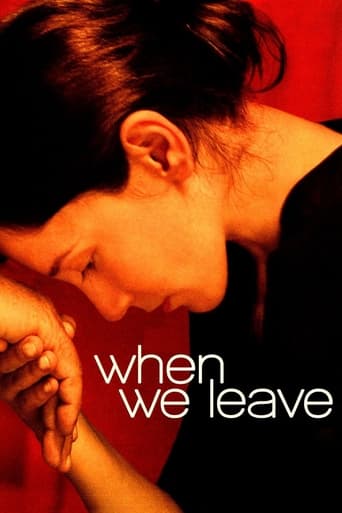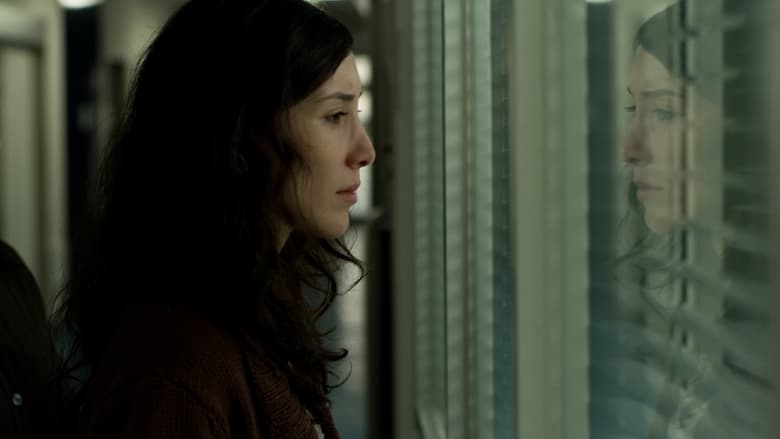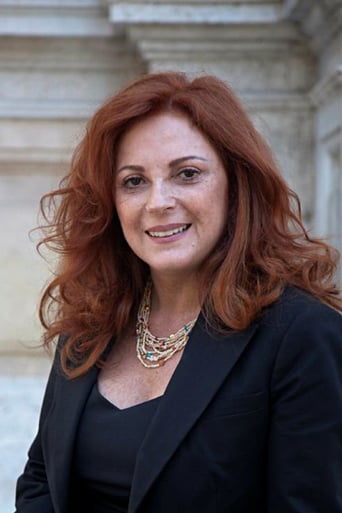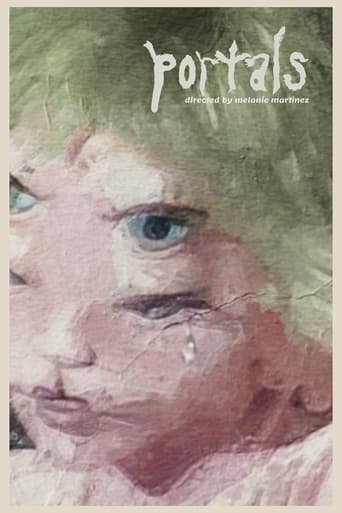

When We Leave (2010)
Umay is a young woman of Turkish descent, fighting for an independent and self-determined life in Germany against the resistance of her family. Her struggle initiates a dynamic, which results in a life-threatening situation.
Watch Trailer
Cast
Similar titles

Reviews
I think this is a new genre that they're all sort of working their way through it and haven't got all the kinks worked out yet but it's a genre that works for me.
Good , But It Is Overrated By Some
While it doesn't offer any answers, it both thrills and makes you think.
Actress is magnificent and exudes a hypnotic screen presence in this affecting drama.
"Die Fremde" or "When We Leave" is a German/Turkish production from 6 years ago. The movie won awards all over the world and was picked as Germany's submission to the Academy Award for the foreign language category. But it was not chosen for a nomination sadly, got snubbed just like "The Edge of Heaven" a couple years earlier. I guess German films with this multi-cultural background just are not to the Academy's liking. Well.. it is their loss as these 110 minutes here are an absolutely outstanding achievement and a truly positive step into filmmaking by writer and director Feo Aladag. And equally much praise from me goes to lead actress Sibel Kekilli, who is in basically every scene of the film and delivers a stunning portrayal as a young Turkish woman/mother whose "terrible" actions (she got divorced, has a German boyfriend, won't give up on her son...) resulted in her being humiliated by her family and becoming an outcast. Yet it is not so easy as she does not want to give up on them and there are moments when they don't seem to give up on her either. It is nice to see that performances like these got her into "Game of Thrones", even if I am not a fan of the series. I hope she can keep having a great career, also abroad. She deserves all the praise and accolades she gets.Umay, the main character, gets humiliated emotionally and occasionally also physically from start to finish here. Kekilli delivers a truly heartbreaking performance of a modern young woman whose love for her son is too big to be able to accept stupid, nonsensical Turkish customs in terms of gender roles. If the man does not want to be with the woman any more, it is all the woman's fault and she has brought shame upon her family. The concept of "Ehrenmord" (honor killings) is just the negative icing on the cake and it is unbelievable that this also still exists today. With stuff like this, it is really hard to feel tolerance and sympathy for immigrants. Of course, I am only referring to these that still believe in the concepts I mentioned before. With the ending, you can argue if a less tragic outcome, maybe with the film ending the moment her brother runs away, may have been better, but it's good both ways I think. Overall, this film is a masterpiece and there is certainly some gigantic irony to the German Film Awards preferring the extremely forgettable "Storm" with a female lead that does not have 1% of Kekilli's greatness. Anyway, "Die Fremde" is an absolute must-see. Highly recommended.
Austrian screenwriter, producer and director Feo Aladag's feature film debut which she wrote and co-produced, premiered in the Panorama section at the 60th Berlin International Film Festival in 2010, was shot on location in Turkey and Germany and is a German production which was produced by Turkish screenwriter, producer and director Züli Aladag. It tells the story about a 25-year-old woman named Umay Aslan who after having had an operation at a hospital in Germany, returns to Istanbul, Turkey where she lives with her adolescent son named Cem, her husband named Kemal and his family. Umay has gotten enough of all the suppression she has endured from Kemal, and the day after her return she packs her bags, takes her son, leaves her miserable marriage and travels to Germany where she thinks she will be welcomed by her parents named Kader and Halyme whom is living there with her brothers named Mehmet and Arcan and her sister named Rana. Distinctly and precisely directed by Austrian filmmaker Feo Aladag, this quietly paced fictional tale which is narrated from multiple viewpoints though mostly from the main character's point of view, draws a reflective and increasingly dramatic portrayal of an adult Turkish-German woman whom after making a decision regarding the best interest and future of her child and herself comes to her parents believing that they will support her viewpoint and learns that their stand on her choice is that she is selfish and that she has disgraced the family name. While notable for it's atmospheric and naturalistic milieu depictions, sterling cinematography by German cinematographer Judith Kaufmann, production design by German production designer Silke Buhr and use of sound, colors and light, this character-driven and narrative-driven story about family relations where the youngest daughter in a family who is about to get married suffers the consequences of her sister's actions, a father and mother and their two sons becomes so ashamed due to their regard of other peoples thoughts and views that they disown their family member and a mother who will no longer jeopardize the well-being of herself and her son for the sake of honouring the expectations of others, depicts two isolating and merging studies of character and contains a great score by German-born British composer Max Richter and Czech composer Stéphane Moucha.This cinematographic, consequential and gently romantic drama from the late 2000s which is set during a summer in Germany in the 21st century and where a father is struggling to forgive his eldest daughter whom has gone against his will and a courageous woman whom is unwanted by her family is heard by a friend and meets a German man named Stipe, is impelled and reinforced by it's cogent narrative structure, substantial character development, rhythmic continuity, pivotal instrumental tones and dialog, scenes of Umay, Umay and Cem and Umay and Stipe and the poignant acting performances by German actress of Turkish descent Sibel Kekilli, Turkish-born German actress Nursel Köse, Turkish actor Settar Tanriögen, Turkish-German actor Tamer Yigit and German actor Florian Lukas. A subtle, sociological and gracefully humane directorial debut which gained, among several other awards, the Label Europa Cinemas Award Feo Aladag at the 60th Berlin Film Festival in 2010.
After seeing this film, I assumed it was directed by a Turkish director named Feo Aladag. When I googled this name, a picture of a young blond woman filled the screen. As it turned out, Feo Aladag is an Austrian actress/director, married to Turkish/German author Zuli Aladag, who is also the producer of Die Fremde. I mention this because I think it is important. In this film, the Turkish community in Germany is not pictured in a very favourable way. The story shows the fate of Umay, a young Turkish/German woman who wants a divorce because her husband beats her and because, perhaps more importantly, she doesn't love him. She leaves her husband and moves with her young son to her family in Berlin. Surprisingly, her father and brother take sides with her husband and urge her to return to him. In their view, she has dishonoured her husband and her own family by separating her son from his father. This conflict escalates in a dramatic way, with terrible consequences. The film pictures Umay as a woman who is denied her 'Western' rights as a woman and a mother, and shows her family as driven by 'non-Western' values like honour and tradition. For them, the community is superior over the individual. For her, it's the other way round. The message is pessimistic. Umay is a Turkish woman who adopts the German lifestyle. She wants to live her own life. She follows the integration model that the Turkish people in Western Europe are supposed to follow. But her brother and sister don't support her, although they are born and raised in Germany. They speak the German language, but think the Turkish way. Like some of the films of Faith Akin (in which lead actress Sibel Kekilli also starred) this film focuses on the problems of the Turkish community in Germany. But it has a darker and more pessimistic tone. It's a very powerful movie, dealing with a very urgent issue.
The treatment of Muslim societies in the media in general and in film in particular has been subject to much agenda setting and bias. On the one hand, this has led to frequently arrogant defamation of the cultures of one fifth of humanity, on the other hand, the discourse has helped to highlight problems of Muslim integration which are often ignored under the convenient excuse of multiculturalism. What is more important: respect for other cultures living among us or concern for the plight of the individual subjected to an excessive chauvinism that allows for nothing but submission to it? Feo Aladag's position on this is clear, but she avoids simplifications by sticking to one woman's story, and keeping that story close, while not identical, to the events that inspired it - namely the much publicized 2005 murder of Hatun Sürücü in Berlin, albeit with a surprising twist. Some may find the depictions of a regressive macho cult in German-Turkish families and social life exaggerated, especially since the acting of the supporting cast is a bit shaky at times. But as someone who has lived in a Turkish neighborhood in Berlin, I have to declare it's not. It's disturbingly close to the truth - not the distorted truth of tabloids, but the truth of people I'm close to.The minimalistic approach of the film would usually render it a rather harmless affair, in spite of its controversial subject matter - were it not for Sibel Kekilli's outstanding performance, for which she received, among other awards, best actress at the Tribeca festival. Her heartfelt, knowing and yet forgiving gaze at the suffocating world she lives in speaks of personal experience with the role she portrays. 'When we leave' establishes her as the most exciting German actress of today.It should be noted, by the way, that Islamic law does not condone honorary murders and considers these just as much as crimes as Western law does. Also, this practice is not exclusive to Muslim societies, but used to be widespread in Christian countries as well, where it might still occur as a justification for homicide. But these clarifications could not have been included in this film, which tells one story, and tells it well.








